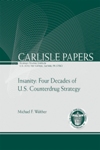U.S. Army War College >> Strategic Studies Institute >> Publications >> Details
Lead Me, Follow Me, Or Get Out of My Way: Rethinking and Refining the Civil-Military Relationship
Authored by Dr. Mark R. Shulman.

- Added September 25, 2012
- Type: Monograph
- 63 Pages
- Download Format:
PDF (Recommended)
Kindle Reader
ePub (Mobile Devices) - Cost: Free
- Send this page to a colleague.
- Alert me when similar studies are published
Brief Synopsis
This monograph explains why robust civil-military relations matter and discusses how they are evolving. Part I discusses A More Perfect Military: How the Constitution Can Make Our Military Stronger by Diane Mazur, a book that examines the jurisprudence that has reshaped civil-military relations. Mazur maintains that since the Vietnam era, the U.S. Supreme Court has hewn the armed forces from general society in order to create a separate—and more socially conservative—sphere. Part II discusses The Decline and Fall of the American Republic by Bruce Ackerman, a wise and wide-ranging book which argues that the nation’s polity is in decline and that the increasingly politicized armed forces may force a change in government. Part III asks where we go from here. The important books attribute a thinning of civilian control over the military to specific legal and political decisions. They explain some of the most important implications of this transformation. They offer proposals about how to improve that critical relationship for the sake of enhancing the effectiveness of the armed forces and the vitality of the republic. This monograph goes on to examine briefly the evolving great power politics, the effects new technologies have on long-standing distinctions and borders, and the relative rise of non-state actors including al Qaeda—three sets of exogenous factors that inevitably drive changes in the civil-military relationship. In the end, this monograph points to a more ambitious enterprise: a complete reexamination of the relationship between force and society.
You may also be interested in the following titles:
Also by the Author/Editor:
The Proliferation Security Initiative as a New Paradigm for Peace and Security
View other pubs in the following categories:
Era of Persistent Conflict
Landpower Employment & Sustainment
Military Strategy and Policy
Civilian Roles
Military Roles
-
Download it Now!
- Download Format:
PDF (Recommended)
Kindle Reader
ePub (Mobile Devices) - PDF File Size: 2.82MB
- Download Format:
-
Hardcopies
- Study is: Available
- Add to Cart
- View Cart
- All hardcopies are free of charge, shipping inclusive.
- All materials on our website are available as a free download.








